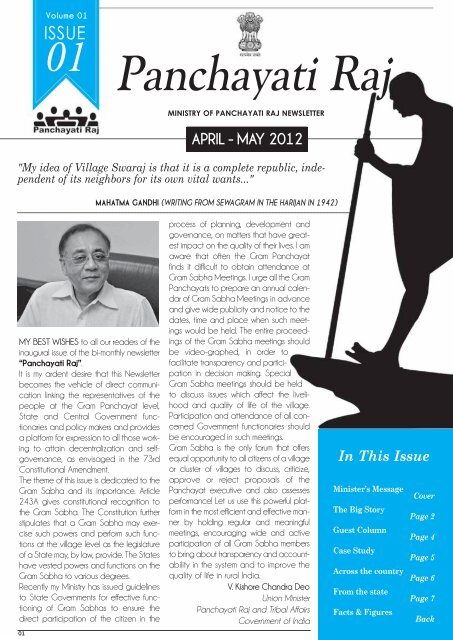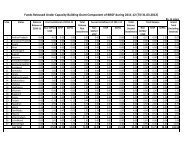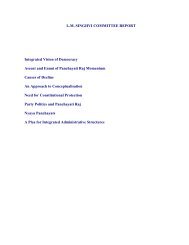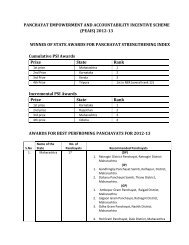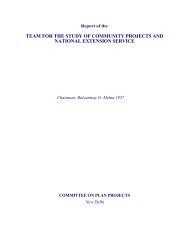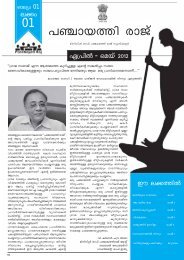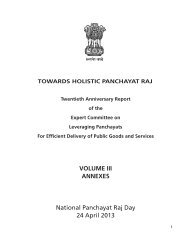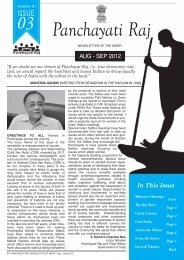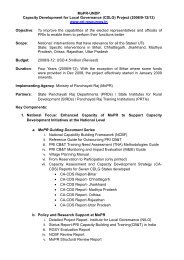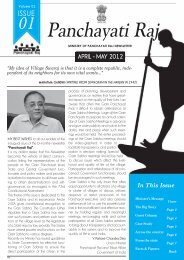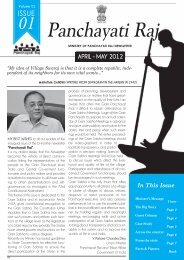English_Arunachal Pradesh - Ministry of Panchayati Raj Ministry of ...
English_Arunachal Pradesh - Ministry of Panchayati Raj Ministry of ...
English_Arunachal Pradesh - Ministry of Panchayati Raj Ministry of ...
Create successful ePaper yourself
Turn your PDF publications into a flip-book with our unique Google optimized e-Paper software.
Volume 01<br />
ISSUE<br />
01<br />
<strong>Panchayati</strong> <strong>Raj</strong><br />
MINISTRY OF PANCHAYATI RAJ NEWSLETTER<br />
APRIL - MAY 2012<br />
"My idea <strong>of</strong> Village Swaraj is that it is a complete republic, independent<br />
<strong>of</strong> its neighbors for its own vital wants..."<br />
MAHATMA GANDHI (WRITING FROM SEWAGRAM IN THE HARIJAN IN 1942)<br />
MY BEST WISHES to all our readers <strong>of</strong> the<br />
inaugural issue <strong>of</strong> the bi-monthly newsletter<br />
“<strong>Panchayati</strong> <strong>Raj</strong>”.<br />
It is my ardent desire that this Newsletter<br />
becomes the vehicle <strong>of</strong> direct communication<br />
linking the representatives <strong>of</strong> the<br />
people at the Gram Panchayat level,<br />
State and Central Government functionaries<br />
and policy makers and provides<br />
a platform for expression to all those working<br />
to attain decentralization and selfgovernance,<br />
as envisaged in the 73rd<br />
Constitutional Amendment.<br />
The theme <strong>of</strong> this issue is dedicated to the<br />
Gram Sabha and its importance. Article<br />
243A gives constitutional recognition to<br />
the Gram Sabha. The Constitution further<br />
stipulates that a Gram Sabha may exercise<br />
such powers and perform such functions<br />
at the village level as the legislature<br />
<strong>of</strong> a State may, by law, provide. The States<br />
have vested powers and functions on the<br />
Gram Sabha to various degrees.<br />
Recently my <strong>Ministry</strong> has issued guidelines<br />
to State Governments for effective functioning<br />
<strong>of</strong> Gram Sabhas to ensure the<br />
direct participation <strong>of</strong> the citizen in the<br />
01<br />
process <strong>of</strong> planning, development and<br />
governance, on matters that have greatest<br />
impact on the quality <strong>of</strong> their lives. I am<br />
aware that <strong>of</strong>ten the Gram Panchayat<br />
finds it difficult to obtain attendance at<br />
Gram Sabha Meetings. I urge all the Gram<br />
Panchayats to prepare an annual calendar<br />
<strong>of</strong> Gram Sabha Meetings in advance<br />
and give wide publicity and notice to the<br />
dates, time and place when such meetings<br />
would be held. The entire proceedings<br />
<strong>of</strong> the Gram Sabha meetings should<br />
be video-graphed, in order to<br />
facilitate transparency and participation<br />
in decision making. Special<br />
Gram Sabha meetings should be held<br />
to discuss issues which affect the livelihood<br />
and quality <strong>of</strong> life <strong>of</strong> the village.<br />
Participation and attendance <strong>of</strong> all concerned<br />
Government functionaries should<br />
be encouraged in such meetings.<br />
Gram Sabha is the only forum that <strong>of</strong>fers<br />
equal opportunity to all citizens <strong>of</strong> a village<br />
or cluster <strong>of</strong> villages to discuss, criticize,<br />
approve or reject proposals <strong>of</strong> the<br />
Panchayat executive and also assesses<br />
performance! Let us use this powerful platform<br />
in the most efficient and effective manner<br />
by holding regular and meaningful<br />
meetings, encouraging wide and active<br />
participation <strong>of</strong> all Gram Sabha members<br />
to bring about transparency and accountability<br />
in the system and to improve the<br />
quality <strong>of</strong> life in rural India.<br />
V. Kishore Chandra Deo<br />
Union Minister<br />
<strong>Panchayati</strong> <strong>Raj</strong> and Tribal Affairs<br />
Government <strong>of</strong> India<br />
In This Issue<br />
Minister’s Message<br />
Cover<br />
The Big Story<br />
Page 2<br />
Guest Column<br />
Page 4<br />
Case Study<br />
Page 5<br />
Across the country<br />
Page 6<br />
From the state<br />
Page 7<br />
Facts & Figures<br />
Back
THE<br />
BIG<br />
STORY<br />
Gram Sabha<br />
& the importance <strong>of</strong><br />
Local Self Governance<br />
Winners <strong>of</strong> the<br />
Rashtirya Gaurav<br />
Gram Sabha<br />
Puraskar 2011 for<br />
outstanding work*<br />
Sri Vinesh Iragouda Patil<br />
Shiraguppi, Belgaum<br />
Karnataka<br />
Shri Rama Sonugaonkar<br />
Kirlapal Dabal, South Goa<br />
Goa<br />
Raheesa Khatoon, sarpanch - Aradaka village, engages villagers in best practices<br />
IN THE PANCHAYATI RAJ set<br />
up, the Gram Sabha, the general<br />
assembly <strong>of</strong> villagers has<br />
a key role for effective functioning<br />
<strong>of</strong> Panchayats. In the<br />
Gram Sabha meeting, the rural<br />
poor, the women and the marginalized<br />
people get an<br />
opportunity to join in decisionmaking<br />
on matters affecting<br />
their lives. Active functioning <strong>of</strong><br />
the Gram Sabha ensures a<br />
participatory democracy with<br />
transparency, accountability<br />
and achievement.<br />
The Gram Sabha is<br />
the key to grassroot<br />
level self governance<br />
02<br />
Raheesa Khatun as Sarpanch<br />
<strong>of</strong> Aradaka village in<br />
<strong>Raj</strong>asthan's Ajmer district, a dry<br />
zone, has toiled to ensure the<br />
Gram Sabha meets regularly<br />
once every three months, to<br />
ease their problem <strong>of</strong> acute<br />
water shortage. With all 450<br />
villagers now participating, the<br />
problem has been solved and<br />
villagers do not have to go<br />
miles to access water.<br />
Another gram sabha in Kirlapal<br />
Dabal village in Goa has<br />
brought about tremendous<br />
change with the construction<br />
<strong>of</strong> roads, a community hall and<br />
an anganwadi. Sarpanch Shri<br />
Rama Sonugaonkar is proud<br />
that not one house in this pan-<br />
Smt Rasilaben Dalsaniya<br />
Depaliya, <strong>Raj</strong>kot<br />
Gujarat<br />
Shri <strong>Raj</strong> Singh<br />
Assan, Rohtak<br />
Haryana<br />
Smt. Sangitabai Koli<br />
Chahardi, Jalgaon<br />
Maharashtra<br />
Smt Raheesa Khatoon<br />
Aradaka, Ajmer<br />
<strong>Raj</strong>asthan<br />
Shri Ganesh Rai<br />
Mellidara-Paiyong,<br />
South District, Sikkim<br />
* The names <strong>of</strong> the awardess for 2012<br />
will be published in the next issue <strong>of</strong><br />
the newsletter.
chayat is without water or electricity.<br />
There is no doubt that a Gram Sabha<br />
is a harbinger <strong>of</strong> change in villages,<br />
and can catalyse overall social and<br />
economic transformation.<br />
The Gram Sabha is the key to grassroots<br />
level self governance and can<br />
ensure transparent and accountable<br />
functioning <strong>of</strong> the Gram Panchayat. It<br />
is defined by the Constitution as a<br />
body consisting <strong>of</strong> all registered voters<br />
<strong>of</strong> a village within the area <strong>of</strong> a village<br />
Panchayat. In its ideal form, the<br />
Gram Sabha <strong>of</strong>fers equal opportunity<br />
to all the villagers to discuss and plan<br />
their development, criticize, approve<br />
or reject Gram Panchayat proposals<br />
and review and monitor implementation<br />
and performance – thereby<br />
immensely improving the accountability<br />
<strong>of</strong> and transparency in the system.<br />
Shri V. Kishore Chandra Deo, the<br />
Minister <strong>of</strong> Tribal Affairs and<br />
<strong>Panchayati</strong> <strong>Raj</strong>, recently reiterated<br />
the government’s focus on Gram<br />
Sabhas by saying that “Gram<br />
Sabhas are the foundation <strong>of</strong> our<br />
<strong>Panchayati</strong> system.”<br />
Several Panchayats have done<br />
exemplary work through effective<br />
Gram Sabhas, adopting best practices<br />
in areas as diverse as water<br />
conservation, developing infrastructure,<br />
crop diversification, employment<br />
and revenue generation, improving<br />
hygiene and ensuring sustainable<br />
development models.<br />
The <strong>Ministry</strong> <strong>of</strong> <strong>Panchayati</strong> <strong>Raj</strong> has<br />
sought to recognize outstanding work<br />
performed by them by instituting the<br />
annual Rashtriya Gaurav Gram Sabha<br />
Puraskar for exemplary performances<br />
in powering local self governance.<br />
Mahatma Gandhi’s dream <strong>of</strong> Gram<br />
Swaraj, or self government through<br />
direct participation at the village<br />
level, is the basis on which the<br />
<strong>Panchayati</strong> <strong>Raj</strong> system functions. It<br />
represents a development and governance<br />
pathway to the future, and is<br />
the only way in which a country <strong>of</strong><br />
India’s size and diversity can be truly<br />
representative <strong>of</strong> the aspirations <strong>of</strong> all<br />
its people.<br />
International Interest in<br />
Indian Local Self Governance<br />
The Union Minister for Tribal Affairs and <strong>Panchayati</strong> <strong>Raj</strong>, Shri V. K. C. Deo with the Minister<br />
<strong>of</strong> Local Government and Regional Development <strong>of</strong> Norway, Ms. Liv Signe Navarsete<br />
THE MODEL OF local self governance<br />
in India has evoked much<br />
interest worldwide. Many countries<br />
have shown keenness in studying<br />
the various decentralisation initiatives<br />
being implemented in India.<br />
The objective <strong>of</strong> many <strong>of</strong> these<br />
interactions is to learn best practises<br />
from India and replicate them in<br />
other parts <strong>of</strong> the world including<br />
Europe and Africa.<br />
Recently, a Norwegian delegation<br />
led by Ms Liv Signe Navarsete,<br />
Minister for Local Government and<br />
Regional Development, Royal<br />
Kingdom <strong>of</strong> Norway, visited India to<br />
study the functioning <strong>of</strong> gram panchayats<br />
in promoting decentralized<br />
governance in India. The delegation<br />
visited the State Election<br />
Commission, Andhra <strong>Pradesh</strong>, to<br />
understand the election process<br />
and the role <strong>of</strong> a constitutional<br />
authority in the same.<br />
This visit was part <strong>of</strong> the various<br />
activities delineated under the<br />
MOU signed between the two<br />
countries to drive a comprehensive<br />
dialogue and deliberation in the<br />
area <strong>of</strong> Local Governance to<br />
facilitate transference <strong>of</strong> competence,<br />
and to strengthen local selfgovernance,<br />
by capacity building<br />
<strong>of</strong> institutions, focusing on areas<br />
relating to achievement <strong>of</strong><br />
Millennium Development goals, e-<br />
Governance, solution sharing and<br />
mobilization <strong>of</strong> resources.<br />
Switzerland, recognised<br />
across the world for its effective<br />
and efficient system <strong>of</strong><br />
direct democracy, is now<br />
turning to India with interest<br />
in local self governance<br />
Similarly, India and Switzerland<br />
have entered into a pact for<br />
strengthening the mutual co-operation<br />
in local self-governance,<br />
including mobilization <strong>of</strong> resources.<br />
High words <strong>of</strong> praise were said by<br />
EUs Ambassador to India H E<br />
Daniele Smadja for India’s<br />
achievement in areas <strong>of</strong> local self<br />
governance, during a recent seminar.<br />
She indicated that the<br />
European Union was keen on<br />
learning best practices in the field<br />
from India.<br />
03
G<br />
uest Column<br />
Effective<br />
Panchayats are<br />
key to Genuine<br />
Democracy<br />
MAKING THE RESIDENTS <strong>of</strong><br />
Mellidara- Paiyong understand<br />
what <strong>Panchayati</strong> institutions stand<br />
for is, I feel, my greatest achievement.<br />
Only a few years ago, people<br />
in this idyllic hamlet in south Sikkim<br />
used to think that Panchayats are<br />
run by the elected members. After<br />
becoming Sarpanch four and a half<br />
years ago, I have managed to successfully<br />
convince people <strong>of</strong> our village<br />
about the importance <strong>of</strong> their<br />
role in Gram Sabhas. The fact is that<br />
members <strong>of</strong> Gram Sabhas play a<br />
much bigger role than that <strong>of</strong> the<br />
elected representatives.<br />
Public participation in our gram sabhas<br />
has gone up dramatically, particularly<br />
since we began announcing<br />
the meeting dates well in<br />
advance and circulating the agenda<br />
for consideration. Now, people<br />
not only come up with suggestions,<br />
but contribute for the development<br />
<strong>of</strong> the village rather than wait for<br />
financial help from outside.<br />
We were the first Gram<br />
Sabha to introduce different<br />
taxes, like a drinking<br />
water tax<br />
Revenue generation models were<br />
not followed widely in Sikkim. We<br />
were the first Gram Sabha to introduce<br />
different taxes, like a drinking<br />
water tax, environment tax, household<br />
registration tax and so on. I<br />
feel pleased to inform you that<br />
these taxes were imposed by the<br />
people themselves. It is heartening<br />
to note that they are not reluctant<br />
to pay. Moreover, within a few<br />
weeks <strong>of</strong> our initiative taking <strong>of</strong>f, the<br />
State government came up with a<br />
notification to other Gram<br />
Panchayats to generate taxes.<br />
Through these taxes we have been<br />
able to construct buildings and<br />
also solve the problem <strong>of</strong> drinking<br />
water shortage.<br />
Maintaining transparency in the<br />
working <strong>of</strong> the Panchayat has<br />
been another primary goal <strong>of</strong> Melli<br />
Dara Paiyong Gram Panchayat<br />
Unit (GPU). We have taken up several<br />
initiatives which would help<br />
make people aware thereby bringing<br />
transparency in the system <strong>of</strong><br />
work. Publishing 'Panchayat<br />
Sandesh' has been a step towards<br />
achieving this very goal. We are living<br />
in the information age, where<br />
our activities are largely governed<br />
by the information we have. It is our<br />
effort to publish details <strong>of</strong> our activities<br />
on our GPU website, including<br />
initiatives like a mobile phone service,<br />
work permission cards and,<br />
GANESH K. RAI<br />
President,<br />
Melli Dara Paiyong Gram Panchayat, Sikkim<br />
Winner <strong>of</strong> the Rashtriya Gaurav Gram Samman<br />
Puraskar<br />
Some <strong>of</strong> the key initiatives undertaken by<br />
Melli Dara Paiyong Gram Panchayat:<br />
SINGLE WINDOW SYSTEM<br />
Service oriented concept<br />
WORK PERMIT CARD<br />
For revenue generation and curbing<br />
crimes<br />
PANCHAYAT SANDESH<br />
Monthly news magazine<br />
SOLID WASTE MANAGEMENT<br />
Recycle waste product and generate<br />
revenue<br />
DRINKING WATER MANAGEMENT<br />
Better service to the people<br />
most recently, our mission to make<br />
this a solid waste free GPU.<br />
I consider gram sabhas as the real<br />
agents <strong>of</strong> change at the village<br />
level. Panchayats must themselves<br />
decide how to involve public participation<br />
in making government programmes<br />
and policies a success at<br />
the grassroots level, and encourage<br />
people to meet their needs locally.<br />
Panchayats are the best institutions<br />
to spread democratic education<br />
and involve the rural community to<br />
undertake rural development.<br />
Administratively, also, it is best if the<br />
local community decides what is<br />
best for it in terms <strong>of</strong> spending, on<br />
infrastructure, or otherwise.<br />
Bureaucrats in state capitals may<br />
not be so familiar about which<br />
locality needs better drainage,<br />
which one needs better drinking<br />
water facilities and so forth. This<br />
must be decided by the local GPU.<br />
The time has come for the<br />
Panchayats <strong>of</strong> our country to realize<br />
their power, as well as their duties<br />
and responsibilities, thereby making<br />
our country the world’s largest<br />
democracy in the truest sense.<br />
Ganesh K. Rai<br />
www.mellidaragrampanchayat.net<br />
04
C ase study - Changing India<br />
<strong>Raj</strong><br />
Samadhiyala<br />
shows the way<br />
RAJ SAMADHIYALA LIES on the<br />
outskirts <strong>of</strong> <strong>Raj</strong>kot district, 25 kms <strong>of</strong>f<br />
the <strong>Raj</strong>kot-Jamnagar highway. The<br />
village has created a benchmark<br />
in rain water harvesting, sanitation<br />
and cleanliness. It has ensured that<br />
every household, school and<br />
Anganwadi has sanitation facilities,<br />
dust and litter free roads, and<br />
proper drainage.<br />
This was not always the case. In<br />
this small hamlet <strong>of</strong> 2000 people<br />
spread over 1500 acres, villagers<br />
decided to take matters<br />
into their own hands, by calling<br />
meetings <strong>of</strong> the Gram Sabha.<br />
Faced with chronic water scarcity,<br />
(the situation was so bad that villagers<br />
from neighbouring villages<br />
refused to marry their daughters<br />
into this village), the villagers took<br />
up the challenge.<br />
Launching a crusade against the<br />
parched desert-like landscape, villagers<br />
constructed small check<br />
dams and tanks with funds from the<br />
District Rural Development Authority<br />
programme. 45 check dams were<br />
built over 1,090 hectares, and their<br />
number is growing. Small check<br />
dams ensured that rainwater percolates<br />
underground, and the<br />
groundwater level has risen<br />
enough for every village house to<br />
now have access to piped water<br />
and proper drainage.<br />
Encouraged by the success <strong>of</strong><br />
the check dams, villagers were<br />
trained and began water harvesting<br />
by developing dykes<br />
using Remote Sensing techniques.<br />
More than 65,000 trees were<br />
planted by the villagers to ward<br />
Check dams which have transformed <strong>Raj</strong> Samadhiyala<br />
<strong>of</strong>f further desertification. They<br />
now have sufficient supplies <strong>of</strong><br />
drinking and agricultural water,<br />
even during drought conditions.<br />
Most amazingly, <strong>Raj</strong> Samadhiyala,<br />
which could earlier barely manage<br />
to grow a single monsoon crop,<br />
recently had three bumper crops in<br />
a single season, with as little as four<br />
inches <strong>of</strong> rainfall in the year! The<br />
annual vegetable sale has gone<br />
<strong>Raj</strong> Samadhiyala gram<br />
samiti has created an<br />
imprint, <strong>of</strong> sustainable<br />
development through<br />
community efforts<br />
up to about ` 25 lakh a year, with<br />
a range <strong>of</strong> crops including wheat,<br />
cauliflower, chillies, tomato, coriander,<br />
brinjal, potato, radish, carrot,<br />
guava, mango, amla, and even<br />
the water- intensive groundnut.<br />
Since the Gram Samiti (Sabha)<br />
was first formed, villagers formulated<br />
and enforced a strict code <strong>of</strong><br />
conduct. Through regular meetings<br />
and sustained efforts, gutkha<br />
sales have been banned in the<br />
village and people are fined for<br />
spitting or littering. There are no<br />
sweepers to collect garbage, the<br />
onus being on the residents, who<br />
take turns to dump the garbage at<br />
the landfill site from their respective<br />
areas. Cow dung and other<br />
wastes are ferried out <strong>of</strong> the village<br />
on bullock carts.<br />
<strong>Raj</strong> Samadhiyala became<br />
Gujarat’s first ZERO PLASTIC village,<br />
with heavy fines imposed for<br />
violating rules.<br />
According to sarpanch<br />
Shardaben Mansukhbhai<br />
Muchhadiya, four gram sabhas<br />
were held in 2011. At their first<br />
meeting in 2012, a social audit <strong>of</strong><br />
MGNREGS was done and strategies<br />
for proposed works were discussed<br />
and fixed for the year. The<br />
village has complete details<br />
about APL and BPL families, birth<br />
and death records and marriage<br />
registration records are maintained<br />
and up to date. Well maintained<br />
Gram Panchayat records<br />
are available, with land records<br />
including title deeds.<br />
To ensure availability <strong>of</strong> clean<br />
drinking water, plans are ready to<br />
install an RO plant in the village, in<br />
collaboration with VASMO.<br />
The <strong>Raj</strong> Samadhiyala gram samiti<br />
has created an imprint, <strong>of</strong> sustainable<br />
development through community<br />
efforts, even across the border.<br />
Even the Government <strong>of</strong> Pakistan<br />
has shown keen interest in their functioning<br />
and wants them to share<br />
knowledge with Pakistani representatives<br />
to develop villages and<br />
improve the quality <strong>of</strong> life.<br />
05
ACROSS THE COUNTRY<br />
News Snippets<br />
J&K ELECTED<br />
REPRESENTATIVES TRAINED<br />
Panchayat elections were held in J<br />
& K, after 3 decades. MoPR organized<br />
training <strong>of</strong> 53 elected representatives<br />
(ERs) and trainers in<br />
Kerala, Odisha, Maharashtra,<br />
<strong>Raj</strong>asthan, AP and Karnataka. ERs<br />
received hands-on-training, learning<br />
about features <strong>of</strong> J&K PR Act.,<br />
roles, responsibilities and business<br />
rules <strong>of</strong> Halaqa Panchayats, Gram<br />
Sabha and its role in development,<br />
preparation <strong>of</strong> panchayat plans<br />
and financial management were<br />
included in the training module.<br />
NO PANCHAYAT AREAS IN N-E<br />
An Inter-Ministerial Team visited<br />
North Eastern States, where<br />
Panchayats do not exist, for reforms<br />
in local self government. Mizoram is<br />
one such State. As a result <strong>of</strong> such<br />
efforts, Mizoram has already constituted<br />
Gram Sabhas. The State has<br />
constituted a State Election<br />
Commission, which now conducts<br />
all elections to Village and District<br />
Councils. In the 6th Schedule,<br />
areas covering districts <strong>of</strong><br />
Lawngthlai and Saiha, the District<br />
Councils have legislated for<br />
women’s reservation.<br />
NATIONAL PANCHAYATI<br />
RAJ DAY<br />
To commemorate the National<br />
<strong>Panchayati</strong> <strong>Raj</strong> Day on 24th April,<br />
the <strong>Ministry</strong> <strong>of</strong> <strong>Panchayati</strong> <strong>Raj</strong> is<br />
organising a national conference<br />
at Vigyan Bhavan, New Delhi. This<br />
will be inaugurated by the Prime<br />
Minister, Dr. Manmohan Singh.<br />
Several annual national awards to<br />
best Gram Panchayats, Panchayat<br />
Empowerment and Accountability<br />
Incentive Scheme (P.E.A.I.S) awards<br />
to State governments and the<br />
Rashtriya Gaurav Gram Sabha<br />
Puraskar to the best Gram Sabha<br />
<strong>of</strong> the country will be presented.<br />
06<br />
Women’s participation in Gram Sabhas<br />
Dr. Hrusikesh Panda, AS, MoPR<br />
in Sarangi village in Jhabua district<br />
AT MEETINGS WITH women representatives<br />
during visits to the<br />
Gram Panchayats <strong>of</strong> Mohanpura,<br />
Devjhiri Panda, Bhagor,<br />
Debarbadi and Narwalia <strong>of</strong><br />
Jhabua Block in Madhya <strong>Pradesh</strong>,<br />
<strong>of</strong>ficials <strong>of</strong> a central team led by<br />
Additional Secretary MoPR, found<br />
that the women were raising not<br />
the usual issues <strong>of</strong> power, roads<br />
and connectivity, but talked <strong>of</strong> irrigation,<br />
second crops, drinking<br />
water, absent teachers and livelihood–related<br />
matters.<br />
The tenor <strong>of</strong> meetings across ten<br />
gram sabhas in Jhabua confirmed<br />
the view that active and vocal<br />
participation by women in gram<br />
THE CONSTITUTION OF India<br />
requires that elections to<br />
Panchayats and Municipalities<br />
should be held before the expiry<br />
<strong>of</strong> its term and, in case <strong>of</strong> dissolution,<br />
within six months from the<br />
date <strong>of</strong> dissolution. The <strong>Ministry</strong> <strong>of</strong><br />
<strong>Panchayati</strong> <strong>Raj</strong> (MoPR) has been<br />
closely monitoring this aspect<br />
because regular elections are<br />
essential for the democratic functioning<br />
<strong>of</strong> local governments.<br />
A case in point is Puducherry,<br />
where Panchayats elections<br />
have not been held within the six<br />
months period. This will mean<br />
that Panchayats in Puducherry<br />
will lose the Central Finance<br />
sabhas raises genuine, critical<br />
issues <strong>of</strong> their livelihood, health<br />
and education.<br />
According to Additional<br />
Secretary Dr. Hrusikesh Panda the<br />
women talked about the need for<br />
proper irrigation to grow additional<br />
crops, crop diversification<br />
for agriculture and tussar cultivation,<br />
and also access to potable<br />
drinking water, the absence <strong>of</strong><br />
teachers in schools and so on.<br />
The <strong>of</strong>ficials gathered information<br />
from the women about the<br />
status <strong>of</strong> women’s empowerment<br />
and other central government -<br />
formulated development<br />
schemes. They informed the<br />
women that in just one year, the<br />
district administration initiated<br />
several projects to empower<br />
women in 30 Gram Panchayats.<br />
They discussed the efficacy <strong>of</strong><br />
these schemes and suggested<br />
that, in order to ease the implementation<br />
process, an integrated<br />
effort was required between<br />
the district administration and<br />
the gram sabhas directly.<br />
Elections to Panchayats and Municipalities<br />
This will mean that panchayats<br />
in Puducherry will lose the<br />
Central Finance Commission<br />
(CFC) grants.<br />
Commission (CFC) grants. The<br />
Municipalities will be deprived <strong>of</strong><br />
JNNURM and other grants. The<br />
MoPR is also going to have a<br />
Plan Scheme to support the<br />
Panchayats, and the<br />
Panchayats in Puducherry will not<br />
be eligible for this. Additional<br />
Secretary, MoPR went to<br />
Puducherry recently and met the<br />
Lt. Governor and the Chief<br />
Minister for holding <strong>of</strong> elections.
07<br />
Rural women released from<br />
socio - economic bondage<br />
Moving ahead for economic freedom<br />
FROM THE STATE <strong>Arunachal</strong> <strong>Pradesh</strong><br />
THE SELF HELP Group (SHG)<br />
movement in <strong>Arunachal</strong><br />
<strong>Pradesh</strong> has unshackled many<br />
women from social and economic<br />
bondage. Rural women<br />
who were till recently forced to<br />
confine themselves to their<br />
homes are now taking major<br />
decisions on their own.<br />
A large section <strong>of</strong> women have<br />
become self-employed or<br />
entrepreneurs through the formation<br />
<strong>of</strong> SHG farmer clubs,<br />
actively encouraged by the<br />
state panchayati raj department.<br />
Women’s empowerment is<br />
a key feature <strong>of</strong> the development<br />
<strong>of</strong> panchayati raj across<br />
India. Women from Gangte village<br />
under Sangram circle<br />
have formed SHGs under the<br />
Rural Development and<br />
Heritage Society (RDHS) over<br />
the past two years. They started<br />
meeting monthly to talk about<br />
savings for their livelihood, then<br />
opened a bank account and<br />
are now able to provide small<br />
loans to its members.<br />
In a remote area like Kurung<br />
Kumey and several other panchayats,<br />
women were dominated<br />
by their husbands and were<br />
not allowed to participate in<br />
social parleys. The husbands’<br />
decisions were final and binding<br />
on the women and housewives.<br />
They were totally secluded<br />
from society and had no<br />
identity <strong>of</strong> their own.<br />
These women are now able to<br />
take their own decisions, raise<br />
Women’s empowerment is a<br />
key feature <strong>of</strong> the development<br />
<strong>of</strong> panchayati raj<br />
across India.<br />
their voices in the decision -<br />
making bodies since the formation<br />
<strong>of</strong> SHGs and non-governmental<br />
organisations which<br />
have also sought to empower<br />
them. Some panchayat women<br />
SHG members participated in<br />
the NABARD sponsored three -<br />
day training – cum - exposure<br />
trips to Jhernapani and Dimapur<br />
to know and learn about mushroom<br />
cultivation. After this<br />
exposure visit, these SHG members<br />
began cultivation <strong>of</strong> mushrooms<br />
and are selling their<br />
products for `100 per kg.<br />
Two SHG members from the<br />
Itanagar circle also participated<br />
in this exposure visit and are<br />
reaping the benefit. They too<br />
have started mushroom cultivation<br />
in Lobi panchayat with<br />
good returns.<br />
Apatanis Document<br />
Unique system with<br />
Panchayats<br />
THE ARUNACHAL PRADESH<br />
Government plans to preserve and<br />
protect the unique integrated agricultural<br />
system <strong>of</strong> the Apatani tribe<br />
with the help <strong>of</strong> GB Pant Institute <strong>of</strong><br />
Himalayan Environment and<br />
Development, Itanagar.<br />
The institute will examine different<br />
farmers’ groups in three village panchayats<br />
in the Apatani Valley, their<br />
nature <strong>of</strong> association, their role in<br />
agro-ecosystem management and<br />
the changes they are facing.<br />
The government also plans to<br />
extend this traditional system <strong>of</strong><br />
farming to the other parts <strong>of</strong> the<br />
state with the help <strong>of</strong> panchayats<br />
to maintain sustainable production<br />
in a specific agro-ecosystem. “The<br />
traditional Apatani farmers have<br />
successfully managed their natural<br />
resources since ages,” said Mihin<br />
Dollo, a scientist with the Institute,<br />
Apatanis’ farming practices integrates<br />
irrigation, animal husbandry<br />
and fisheries with agriculture that<br />
adds more novelty to the system.<br />
Their irrigation system is over a<br />
century old, and has been perfected<br />
through community involvement<br />
and equitable sharing <strong>of</strong><br />
water resources. The traditional<br />
agricultural systems may benefit<br />
from the use <strong>of</strong> newer, appropriate<br />
technologies based on farmers’<br />
agro-ecological knowledge. It is<br />
important to document and revitalize<br />
this knowledge, which is<br />
quickly disappearing. Panchayats<br />
are intervening to document the<br />
unique integrated agricultural system<br />
<strong>of</strong> the Apatanis.<br />
According to Dollo, the Apatanis<br />
are passing through a transitional<br />
phase, due to outside influences. “A<br />
conservative community, they are<br />
on the verge <strong>of</strong> parting with some<br />
traditional agro-ecosystem management<br />
practices due to integration<br />
<strong>of</strong> hired labour from outside.”
Statewise Panchayats at different tiers<br />
State / UT<br />
Andhra <strong>Pradesh</strong><br />
<strong>Arunachal</strong> <strong>Pradesh</strong><br />
Assam<br />
Bihar<br />
Chhattisgarh<br />
Goa<br />
Gujarat<br />
Haryana<br />
Himachal <strong>Pradesh</strong><br />
J&K<br />
Jharkhand<br />
Karnataka<br />
Kerala<br />
Madhya <strong>Pradesh</strong><br />
Maharashtra<br />
Manipur<br />
Odisha<br />
Punjab<br />
<strong>Raj</strong>asthan<br />
Sikkim<br />
Tamil Nadu<br />
Tripura<br />
Uttar <strong>Pradesh</strong><br />
Uttarakhand<br />
West Bengal<br />
A & N Island<br />
Chandigarh<br />
D & N Haveli<br />
Daman & Diu<br />
Lakshadweep<br />
Puducherry<br />
Total<br />
District<br />
Panchayats<br />
22<br />
16<br />
21<br />
38<br />
18<br />
-<br />
26<br />
21<br />
12<br />
22<br />
24<br />
30<br />
14<br />
50<br />
33<br />
4<br />
30<br />
20<br />
33<br />
4<br />
30<br />
4<br />
72<br />
13<br />
18<br />
3<br />
1<br />
1<br />
1<br />
1<br />
-<br />
584<br />
Intermediate<br />
Panchayats<br />
1098<br />
155<br />
191<br />
534<br />
146<br />
-<br />
223<br />
119<br />
77<br />
143<br />
257<br />
176<br />
152<br />
313<br />
352<br />
-<br />
314<br />
142<br />
243<br />
-<br />
385<br />
23<br />
821<br />
95<br />
333<br />
9<br />
1<br />
-<br />
-<br />
-<br />
10<br />
6312<br />
Gram<br />
Panchayats<br />
21852<br />
1756<br />
2205<br />
8474<br />
10033<br />
190<br />
14144<br />
6279<br />
3241<br />
4089<br />
4464<br />
5631<br />
977<br />
23028<br />
27971<br />
160<br />
6234<br />
12800<br />
9201<br />
163<br />
12617<br />
511<br />
52021<br />
7555<br />
3352<br />
67<br />
17<br />
11<br />
14<br />
10<br />
98<br />
239165<br />
Total<br />
22972<br />
1927<br />
2417<br />
9046<br />
10197<br />
190<br />
14393<br />
6419<br />
3330<br />
4254<br />
4745<br />
5631<br />
1143<br />
23391<br />
164<br />
6578<br />
12962<br />
9477<br />
167<br />
13032<br />
538<br />
52914<br />
7663<br />
3703<br />
79<br />
19<br />
12<br />
15<br />
11<br />
108<br />
246061<br />
The Panchayat<br />
system in India aims<br />
to act as an<br />
effective unit <strong>of</strong><br />
administration and<br />
performing functions<br />
affecting almost all<br />
aspects <strong>of</strong> the<br />
village community.<br />
The Constitutional<br />
(73rd Amendment)<br />
Act, 1992 looks to<br />
provide a 3-tier<br />
system for all states,<br />
to hold Panchayat<br />
elections regularly<br />
and to provide<br />
reservation <strong>of</strong> seats<br />
for SCs, STs and<br />
women. The 3-tier<br />
system consists <strong>of</strong> :<br />
Gram level<br />
panchayat,<br />
Intermediate level<br />
panchayat, and<br />
District level<br />
panchayat.<br />
FEEDBACK<br />
Any response or suggestions<br />
regarding this<br />
newsletter would be welcome.You<br />
can contact us<br />
with your feedback as per<br />
details mentioned below :<br />
PO Box: #2, New Delhi<br />
Email:<br />
newsletter-mopr@nic.in<br />
SMS: to +91-<br />
92200-92200<br />
Panchayat<br />
Village<br />
Block<br />
District<br />
State<br />
ADDRESS<br />
___________________________________<br />
___________________________________<br />
___________________________________<br />
___________________________________<br />
___________________________________<br />
CONTEST<br />
Dear Readers,<br />
An interesting way to test<br />
your knowledge about Gram<br />
Sabhas:<br />
Do you have to be elected<br />
to become a member <strong>of</strong> a<br />
Gram Sabha?<br />
Yes No<br />
You can reach us with your<br />
answers at:<br />
PO Box: #2, New Delhi<br />
Email:<br />
newsletter-mopr@nic.in<br />
SMS: to<br />
+91-92200-92200<br />
Printed and published by the <strong>Ministry</strong> <strong>of</strong> <strong>Panchayati</strong> <strong>Raj</strong>, Government <strong>of</strong> India. Editor-in-Chief: Dr. Hrusikesh Panda.<br />
Printed at Asia Pacific Communication Associates Pvt Ltd C/O Cirrus Graphics Pvt Ltd, B 62/14, Phase II, Naraina Industrial Area, New Delhi -<br />
110 028 Published from <strong>Ministry</strong> <strong>of</strong> <strong>Panchayati</strong> <strong>Raj</strong>, Govt <strong>of</strong> India, Sardar Patel Bhawan, New Delhi - 110001<br />
08<br />
DELENG18242


